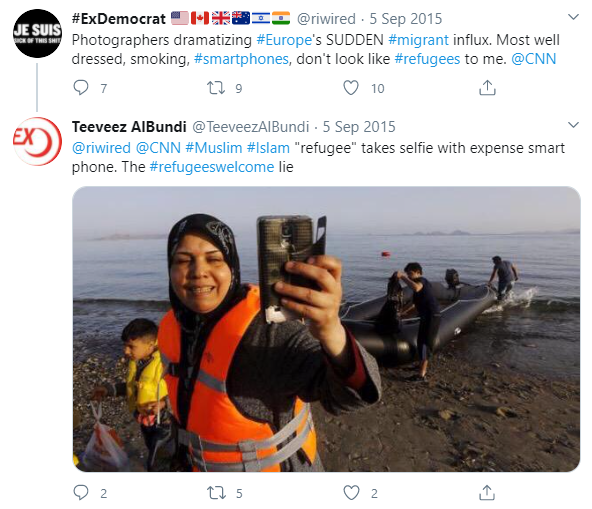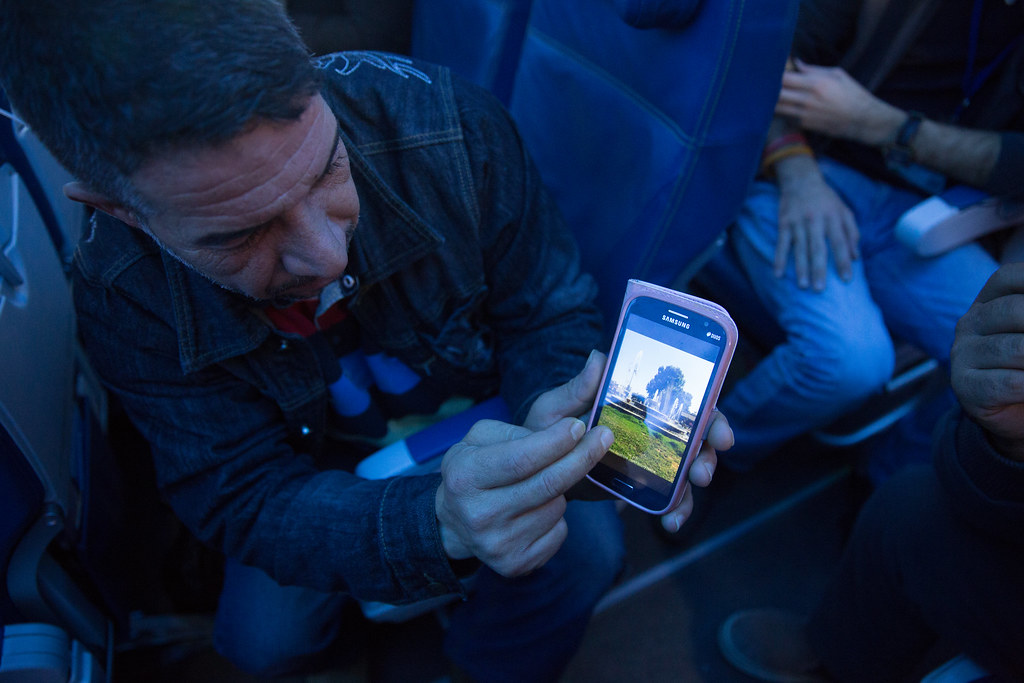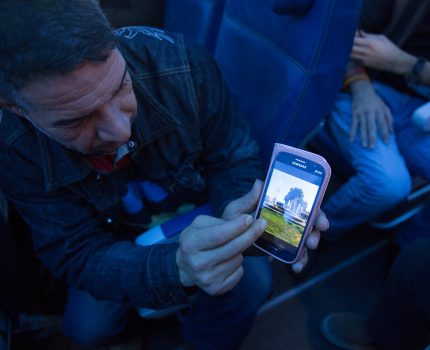Estimated reading time: 5 minutes, 15 seconds.
In 2015, at the height of the European migrant crisis, images of refugees using smartphones and taking selfies circulating online caused a backlash among Westerners who were anti-immigration. They were outraged that a ‘so-called refugee’ could afford a smartphone and could hold onto it throughout their arduous journey.
Critics suggest that those who are fleeing mass casualties, political oppression, and extreme destitution shouldn’t be carrying around these devices—because it signals that they really don’t need help after all.
Daily Dot
This shows a deep lack of understanding among these groups; firstly, about what a refugee is, and that anyone can be a refugee, from any walk of life or social background. Secondly, as Ivy Kaplan writes for The Globe Post, that a mobile phone is now considered one of the three most important items refugees take with them when they are unexpectedly forced to leave their homes, along with food and water. Access to electricity to charge a phone can be a question of life and death in certain circumstances.

Not only that, but smartphones are a vital tool throughout the refugee experience. Here are eight ways smartphones are used by refugees, from before they leave home to their resettlement in the host community.
- Documenting the situation in their home country
For people caught up in conflict, before even considering their refugee journey, the smartphone is used to document what’s going on in their country. They take pictures of protests, or of the aftermath of conflict for example, to tell the story of what is happening.
- Planning and navigating their journey
Smartphones are not only used to find news and updates about the crisis in their country, but apps and social media, in particular Facebook groups, are crucial for planning a refugee’s trip, from deciding on a route to getting tips for what to pack. Facebook groups are used by smugglers to advertise their services, allowing refugees to compare rates. People have even begun using Facebook groups to share their routes so that refugees can go it alone, without the need for a smuggler, or to warn about unscrupulous ones. Trust is a huge issue for many refugees, and social media and Facebook groups help confirm correct information and challenge rumours.
Refugees use Google Maps to help them find their way and they share their GPS location with relatives or volunteers.
Those traveling by boat often use WhatsApp to update their location on Google Maps, a move that lets them avoid astronomical calling rates and alert the authorities to their location should trouble arise.
Alessandra Ram, Wired
Governments, media organisations and NGOs have also developed sites such as InfoMigrants, which aims to combat misinformation at every step of a migrant’s journey, and Refugee.Info, which helps refugees exercise their legal rights.
Once they arrive at their destination, websites like Refugees Welcome help refugees find a place to stay, working similarly to Airbnb.
- Communicating with and finding loved ones
Messaging apps such as Whatsapp and Facebook are used by refugees to stay in touch with loved ones, and update them on their whereabouts. It’s not surprising, then, that when someone arrives safely at their destination, they take a selfie to send to their friends and family to let them know they are safe.
As well as this, apps also exist to help refugees find missing family members, such as the Red Cross’s Trace the Face, which allows refugees to upload a photo in order to locate and reunite with relatives.
- Making payments
Mobile phones can be used to make payments during a refugee’s journey itself, and mobile payments also have many uses once they arrive at their destination. One example is International Money Transfers, which can be accessed more affordably and easily through mobile. Refugees who are able to work in host countries can send remittances home, and those living in refugee camps and unable to work often rely on receiving remittances from family and friends elsewhere.
- Resettling in host communities
A refugee’s journey isn’t over when they arrive in their host country; they still need to find a place to live, find a job, learn the local language, and learn about the local culture, among other things. Gherbtna is an app containing resources for resettlement, such as obtaining residency and opening a bank account. Translation and language learning apps are vital for speaking with locals and understanding documents. And mobile phones are important for refugees’ livelihoods, enabling them to find employment, or run a small business. They use mobile phones to inform themselves about the availability of paid work, affordable housing and social and medical services in areas they’re considering moving to.
Refugees may also have experienced trauma, for example having lost loved ones, their home, livelihood and community, and they may also have lost their support network. Karim is a chatbot in Arabic that helps Syrian refugees by providing support with mental health issues.
In Mancini et al’s scoping review, The opportunities and risks of mobile phones for refugees’ experiences (2019), they found that having access to mobile technology had therapeutic and educational benefits, such as for cultural integration and community support, as well as enabling women’s personal empowerment and self-assertion and enhancing their wellbeing.
- Remembering their past life
As refugees settle in a new country, the archive of photos on their smartphones becomes important in confirming their status as refugees and in remembering their past life; not only to remember the happy times with family but also to recognize and process their experience. Now distanced from what is happening at home, news sites and social media become important in staying up to date with developments.
With all of the points above, it should be easy to see why smartphones and social media are a vital part of a refugee’s toolkit. Those that criticize refugees with smartphones are conjuring an antiquated image of refugees as poor and unable to afford the ‘luxury’ of a mobile phone, when in fact not all refugees are poor, and on the other hand, smartphones don’t have to be expensive. Often used for frivolous purposes in the West, they may be considered a luxury there, but for people forced to flee their country, they are essential.
Do you know of any other ways that refugees use mobile phones? Please tell us in the comments below.
This post is written by Jessica Wright. Find out more about the authors of this blog.
References
Alter, L (2015) People are outraged to see refugees with smartphones. They shouldn’t be. Retrieved October 1, 2020. https://www.treehugger.com/people-are-outraged-see-refugees-smartphones-they-shouldnt-be-4867591
Göransson, M., Hultin, L., Mähring, M. (2020) ‘The phone means everything.’ Mobile phones, livelihoods and social capital among Syrian refugees in informal tented settlements in Lebanon. Migration & Development.
GSMA (2017) The Importance of Mobile for Refugees: A Landscape of New Services and Approaches. London: GSMA.
Kaplan, I. (2018) How smartphones and social media have revolutionized refugee migration. Retrieved October 1, 2020. https://theglobepost.com/2018/10/19/refugees-social-media/
Mancini, T., Sibilla, F., Argiropoulos, D., Rossi, M., Everri, M. (2019). The opportunities and risks of mobile phones for refugees’ experience: A scoping review. PLoS ONE. 14(12)
O’Malley, J (2015) Surprised that Syrian refugees have smartphones? Sorry to break this to you, but you’re an idiot. Retrieved October 1, 2020, from Independent. https://www.independent.co.uk/voices/comment/surprised-syrian-refugees-have-smartphones-well-sorry-break-you-you-re-idiot-10489719.html
Ram, A. (2015) Smartphones bring solace and aid to desperate refugees. Retrieved October 1, 2020, from Wired. https://www.wired.com/2015/12/smartphone-syrian-refugee-crisis/
Solon, O. (2016) Karim the AI delivers psychological support to Syrian refugees. Retrieved October 1, 2020, from The Guardian. https://www.theguardian.com/technology/2016/mar/22/karim-the-ai-delivers-psychological-support-to-syrian-refugees
Stop shaming Syrian refugees for using cellphones (2020) Retrieved October 1, 2020. https://www.dailydot.com/unclick/syria-refugees-cell-phone-use/
Taylor, L. (2017) What is data justice? The case for connecting digital rights and freedoms on the global level. Big Data & Society. 4(2)
USAID (2018) Reflecting the Past, Shaping the Future: Making AI Work for International Development. Washington, DC: USAID.

